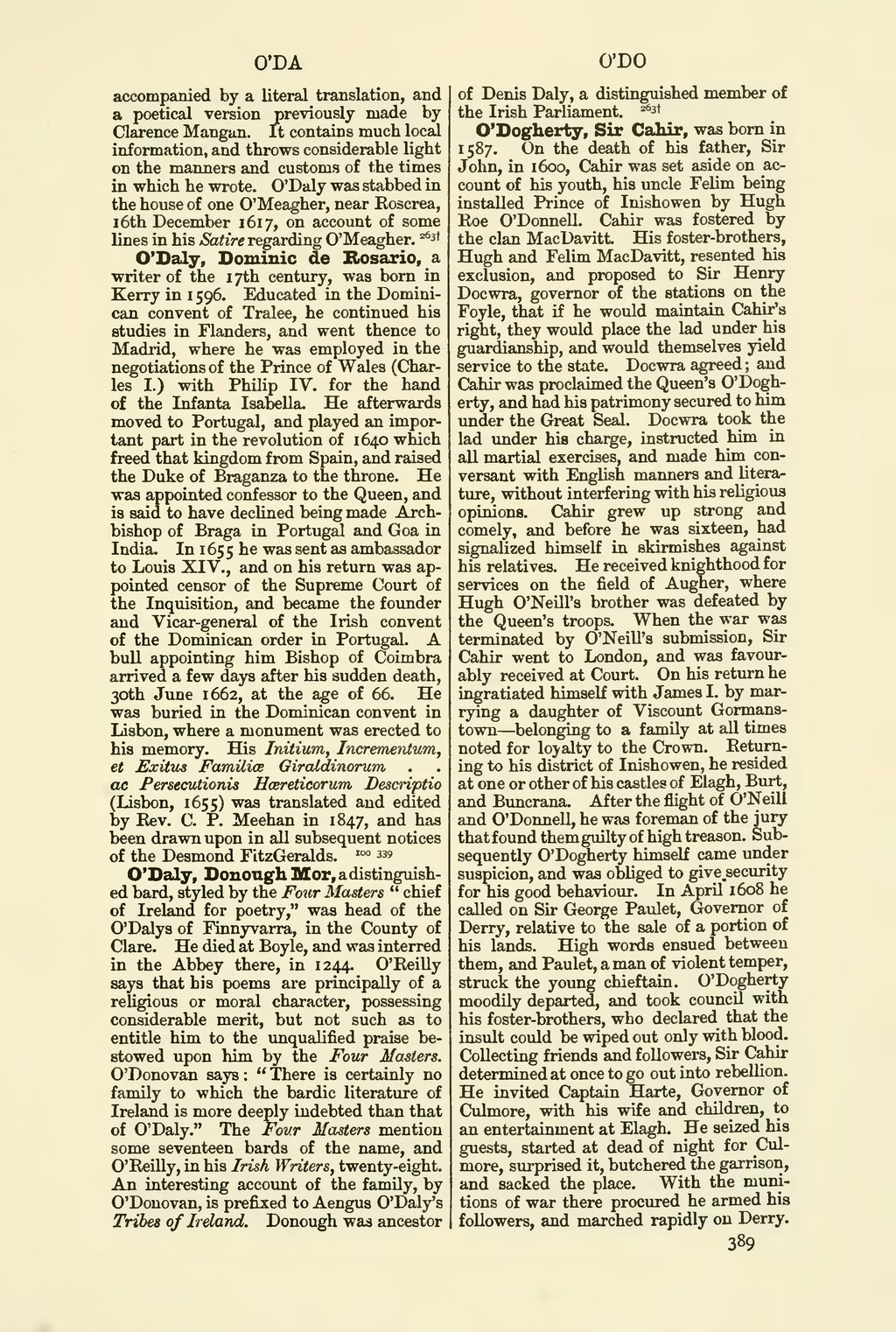O'DA
accompanied by a literal translation, and a poetical version previously made by Clarence Mangan. It contains much local information, and throws considerable light on the manners and customs of the times in which he wrote. O'Daly was stabbed in the house of one O' Meagher, near Eoscrea, 1 6th December 1617, on account of some lines in his Satire regarding O'Meagher. ^^f O'Daly, Dominic de Rosario, a writer of the 17th century, was born in Kerry in 1596. Educated in the Domini- can convent of Tralee, he continued his studies in Flanders, and went thence to Madrid, where he was employed in the negotiations of the Prince of Wales (Char- les I.) with Philip IV. for the hand of the Infanta Isabella. He afterwards moved to Portugal, and played an impor- tant part in the revolution of 1640 which freed that kingdom from Spain, and raised the Duke of Braganza to the throne. He was appointed confessor to the Queen, and is said to have declined being made Arch- bishop of Braga in Portugal and Goa in India. In 1 65 5 he was sent as ambassador to Louis XIV., and on his return was ap- pointed censor of the Supreme Court of the Inquisition, and became the founder aud Vicar-general of the Irish convent of the Dominican order in Portugal. A bull appointing him Bishop of Coimbra arrived a few days after his sudden death, 30th June 1662, at the age of 66. He was buried in the Dominican convent in Lisbon, where a monument was erected to his memory. His Initium, IncremeiUum, et Exitus Familioe Giraldinorum . ac Persecutionis Hcereticorum Descriptio (Lisbon, 1655) was translated and edited by Rev. C. P. Meehan in 1847, and has been drawn upon in all subsequent notices of the Desmond FitzGeralds. ^°° 339
O'Daly, DonotigliMor, a distinguish- ed bard, styled by the Four Masters " chief of Ireland for poetry," was head of the O'Dalys of Finnyvarra, in the County of Clare. He died at Boyle, and was interred in the Abbey there, in 1244. O'Reilly says that his poems are principally of a religious or moral character, possessing considerable merit, but not such as to entitle him to the unqualified praise be- stowed upon him by the Four Masters. O'Donovan says : " There is certainly no family to which the bardic literature of Ireland is more deeply indebted than that of O'Daly." The Four Masters mention some seventeen bards of the name, and O'Reilly, in his Irish Writers, twenty-eight. An interesting account of the family, by O'Donovan, is prefi:xed to Aengus O'Daly's Tribes of Ireland. Donough was ancestor
O'DO
of Denis Daly, a distinguished member of the Irish Parliament. =*3t
O'Dogherty, Sir Cahir, was born in 1587. On the death of his father, Sir John, in 1600, Cahir was set aside on ac- count of his youth, his uncle Felim being installed Prince of Inishowen by Hugh Roe O'Donnell, Cahir was fostered by the clan MacDavitt, His foster-brothers, Hugh and Felim MacDavitt, resented his exclusion, and proposed to Sir Henry Docwra, governor of the stations on the Foyle, that if he would maintain Cahir's right, they would place the lad underhis guardianship, and would themselves yield service to the state. Docwra agreed ; and Cahir was proclaimed the Queen's O'Dogh- erty, and had his patrimony secured to him under the Great Seal. Docwra took the lad under his charge, instructed him in all martial exercises, and made him con- versant with English manners and litera- ture, without interfering with his religious opinions. Cahir grew up strong and comely, and before he was sixteen, had signalized himself in skirmishes against his relatives. He received knighthood for services on the field of Augher, where Hugh O'Neill's brother was defeated by the Queen's troops. When the war was terminated by O'Neill's submission, Sir Cahir went to London, and was favour- ably received at Court. On his return he ingratiated himself with James I. by mar- rying a daughter of Viscount Gormans- town — belonging to a family at all times noted for loyalty to the Crown. Return- ing to his district of Inishowen, he resided at one or other of his castles of Elagh, Burt, and Buncrana. After the flight of O'Neill and O'Donnell, he was foreman of the jury that found themgtdltyof high treason. Sub- sequently O'Dogherty himself came under suspicion, and was obliged to give.security for his good behaviour. In April 1608 he called on Sir George Paulet, Governor of Derry, relative to the sale of a portion of his lands. High words ensued between them, and Paulet, a man of violent temper, struck the young chieftain. O'Dogherty moodily departed, and took councU with his foster-brothers, who declared that the insult could be wiped out only with blood. Collecting friends and followers, Sir Cahir determined at once to go out into rebellion. He invited Captain Harte, Governor of Culmore, with his wife and children, to an entertainment at Elagh. He seized his guests, started at dead of night for Cul- more, surprised it, butchered the garrison, and sacked the place. With the muni- tions of war there procured he armed his followers, and marched rapidly on Derry. 389
